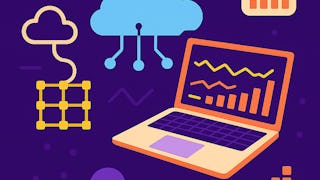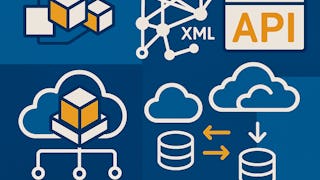- Browse
- Parallel Computing
Parallel Computing Courses
Parallel computing courses can help you learn about distributed systems, concurrency, and performance optimization techniques. You can build skills in task scheduling, load balancing, and debugging parallel applications. Many courses introduce tools like MPI (Message Passing Interface) and OpenMP, that support implementing parallel algorithms and enhancing computational efficiency.
Popular Parallel Computing Courses and Certifications
 Status: Free TrialFree TrialU
Status: Free TrialFree TrialUUniversity of Colorado Boulder
Skills you'll gain: Hardware Architecture, Bash (Scripting Language), Distributed Computing, Scalability, Computer Systems, File I/O, Big Data, Operating Systems, File Systems, Scripting, Command-Line Interface, C and C++, Performance Tuning, Computer Programming Tools, Linux, Load Balancing, Programming Principles, Communication Systems, Linear Algebra
3.8·Rating, 3.8 out of 5 stars171 reviewsAdvanced · Specialization · 3 - 6 Months
 Status: Free TrialFree TrialU
Status: Free TrialFree TrialUUniversity of Colorado Boulder
Skills you'll gain: Bash (Scripting Language), Scalability, Distributed Computing, Computer Systems, Big Data, Operating Systems, File Systems, Linux, Scripting, Command-Line Interface, Performance Tuning, Programming Principles
Build toward a degree
3.7·Rating, 3.7 out of 5 stars159 reviewsBeginner · Course · 1 - 4 Weeks
 Status: NewNewStatus: Free TrialFree TrialU
Status: NewNewStatus: Free TrialFree TrialUUniversity of Pittsburgh
Skills you'll gain: Apache Hadoop, Cloud Computing, Apache Spark, Web Services, Cloud Services, Cloud Computing Architecture, Cloud Infrastructure, PySpark, Cloud Applications, Cloud Platforms, Data Pipelines, Google Cloud Platform, Distributed Computing, Data Processing, Cloud Storage, Docker (Software), Virtualization, Containerization, Restful API, Data Architecture
Build toward a degree
Intermediate · Specialization · 1 - 3 Months
 Status: NewNewU
Status: NewNewUUniversity of London
Skills you'll gain: Algorithms, Computational Thinking, Theoretical Computer Science, Programming Principles, Computational Logic, Critical Thinking and Problem Solving, Performance Testing, Computer Science, Data Structures, Critical Thinking, Logical Reasoning, Graph Theory, Complex Problem Solving, Analysis, Game Theory
Intermediate · Course · 1 - 4 Weeks
 Status: NewNewStatus: Free TrialFree TrialU
Status: NewNewStatus: Free TrialFree TrialUUniversity of Pittsburgh
Skills you'll gain: Web Services, Cloud Computing, Cloud Computing Architecture, Cloud Storage, Cloud Infrastructure, Cloud Applications, Google Cloud Platform, Flask (Web Framework), Distributed Computing, Containerization, Software Architecture, Docker (Software), Virtualization, Restful API, JSON, Microservices, Scalability, Extensible Markup Language (XML), API Design, Computer Architecture
Build toward a degree
Intermediate · Course · 1 - 3 Months
 Status: NewNewU
Status: NewNewUUniversity of London
Skills you'll gain: Theoretical Computer Science, Computational Logic, Programming Principles, Computer Science, Algorithms, Computational Thinking, Database Theory, Mathematical Modeling, Data Structures, General Mathematics, Applied Mathematics, Business Mathematics, Advanced Mathematics, Logical Reasoning, Problem Solving
Beginner · Course · 1 - 4 Weeks
What brings you to Coursera today?
 Status: Free TrialFree TrialR
Status: Free TrialFree TrialRRice University
Skills you'll gain: Apache Kafka, Apache Spark, Apache Hadoop, Distributed Computing, Dataflow, Java Programming, Java, Software Architecture, Systems Architecture, Scala Programming, Data Structures, System Programming, Programming Principles, Servers, Application Frameworks, Debugging, Algorithms, Performance Tuning, Functional Design, Performance Testing
4.6·Rating, 4.6 out of 5 stars1.6K reviewsIntermediate · Specialization · 3 - 6 Months
 Status: Free TrialFree TrialU
Status: Free TrialFree TrialUUniversity of Colorado Boulder
Skills you'll gain: File I/O, C and C++, Load Balancing, Communication Systems
4.6·Rating, 4.6 out of 5 stars12 reviewsAdvanced · Course · 1 - 3 Months
 Status: Free TrialFree TrialJ
Status: Free TrialFree TrialJJohns Hopkins University
Skills you'll gain: Artificial Neural Networks, Image Analysis, Event-Driven Programming, Scalability, Deep Learning, C and C++, Performance Tuning, Convolutional Neural Networks, Data-oriented programming, Distributed Computing, Linear Algebra, Computer Graphics, Hardware Architecture, Mathematical Software, Numerical Analysis, Programming Principles, Computer Architecture, System Programming, Program Development, Machine Learning
Build toward a degree
2.8·Rating, 2.8 out of 5 stars189 reviewsIntermediate · Specialization · 3 - 6 Months
 Status: Free TrialFree Trial
Status: Free TrialFree TrialSkills you'll gain: Cloud Computing Architecture, Cloud Services, Cloud Deployment, Cloud Security, Cloud Infrastructure, Cloud Platforms, Cloud Computing, Cloud Storage, Infrastructure As A Service (IaaS), Emerging Technologies, Hybrid Cloud Computing, Virtual Machines, Serverless Computing, Microservices, DevOps
4.6·Rating, 4.6 out of 5 stars7.7K reviewsBeginner · Course · 1 - 3 Months
 Status: Free TrialFree TrialU
Status: Free TrialFree TrialUUniversity of Illinois Urbana-Champaign
Skills you'll gain: Distributed Computing, Cloud Infrastructure, Cloud Services, Big Data, Apache Spark, Cloud Computing, Cloud Storage, Cloud Platforms, Network Architecture, Computer Networking, File Systems, Apache Hadoop, Cloud Applications, Apache Mahout, Cloud Computing Architecture, Infrastructure As A Service (IaaS), Data Storage, Middleware, Software-Defined Networking, NoSQL
4.3·Rating, 4.3 out of 5 stars2.1K reviewsIntermediate · Specialization · 3 - 6 Months
 Status: Free TrialFree TrialJ
Status: Free TrialFree TrialJJohns Hopkins University
Skills you'll gain: Apache Hadoop, Big Data, Apache Hive, Apache Spark, NoSQL, Data Infrastructure, File Systems, Data Processing, Data Management, Analytics, Data Science, Databases, SQL, Query Languages, Data Manipulation, Java, Data Structures, Distributed Computing, Scripting Languages, Performance Tuning
4.5·Rating, 4.5 out of 5 stars8 reviewsIntermediate · Specialization · 3 - 6 Months
In summary, here are 10 of our most popular parallel computing courses
- High-Performance and Parallel Computing: University of Colorado Boulder
- Introduction to High-Performance and Parallel Computing: University of Colorado Boulder
- Cloud Computing for Data Science: University of Pittsburgh
- Algorithms and Complexity: University of London
- Distributed Systems and Web Services: University of Pittsburgh
- Mathematical Foundations for Computing: University of London
- Parallel, Concurrent, and Distributed Programming in Java: Rice University
- Parallel Computing with MPI: University of Colorado Boulder
- GPU Programming: Johns Hopkins University
- Introduction to Cloud Computing: IBM
Frequently Asked Questions about Parallel Computing
Parallel computing is a method of computation where multiple calculations or processes are carried out simultaneously. This approach is crucial in today's data-driven world, as it allows for faster processing and the ability to tackle complex problems that would be infeasible with traditional sequential computing. By distributing tasks across multiple processors, parallel computing enhances performance and efficiency, making it essential for applications in fields like scientific research, big data analysis, and artificial intelligence.
A variety of job opportunities exist in the field of parallel computing. Positions range from software developers and systems architects to data scientists and research engineers. Industries such as technology, finance, healthcare, and academia are increasingly seeking professionals who can leverage parallel computing to optimize performance and solve large-scale problems. Roles may involve designing parallel algorithms, developing high-performance computing systems, or working with cloud computing solutions.
To excel in parallel computing, you should develop a solid foundation in programming languages such as C, C++, or Python, as well as an understanding of parallel algorithms and data structures. Familiarity with parallel computing frameworks like MPI (Message Passing Interface) and OpenMP is also beneficial. Additionally, knowledge of computer architecture, operating systems, and performance optimization techniques will enhance your skill set and prepare you for real-world applications.
There are several excellent online courses available for those interested in parallel computing. Notable options include the High-Performance and Parallel Computing Specialization and the Introduction to High-Performance and Parallel Computing. These courses provide comprehensive insights into the principles and practices of parallel computing, catering to various skill levels.
Typical topics covered in parallel computing courses include parallel algorithms, performance analysis, parallel programming models, and the use of frameworks like MPI and OpenMP. Courses may also explore the architecture of parallel systems, cloud computing integration, and case studies demonstrating the application of parallel computing in various fields. This comprehensive curriculum equips learners with the necessary tools to tackle complex computational challenges.
For training and upskilling employees in parallel computing, the High-Performance and Parallel Computing Specialization is an excellent choice. It offers a structured approach to learning essential concepts and practical skills. Additionally, the Parallel Computing with MPI course focuses on a widely-used framework, making it valuable for teams looking to enhance their capabilities in parallel processing.










